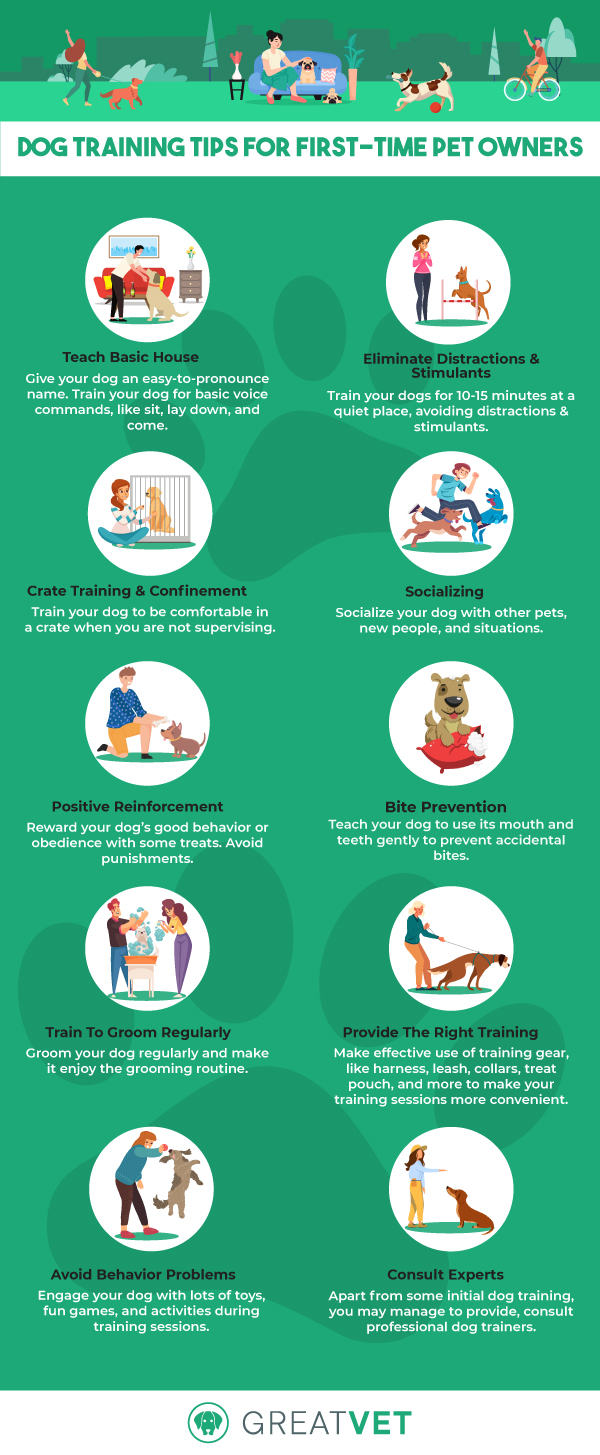Table of Contents
You’ve just taken your gorgeous pet companion home and are wondering what the first thing you should teach him?
The first and most important thing you should do as a pet parent is to teach them basic manners. Identifying their names, potty training, and socialization skills, which encompass people, places, and things, are all part of it.
Why Should We Train Our Dog?
Getting your dog home is the first step; you must also take on the responsibility of raising and training it. Early training gives your dog confidence, develops the human-animal link, and provides cerebral stimulation. It’s never too late to begin dog training.
Dogs with nervousness and timid temperament benefit from training. If we teach our four-legged friend the basic fundamental manners, we will be able to converse with them. When they follow our demands or instructions, it feels like a victory. It also fosters a strong link between you and your pet and brings us closer together.
Mental stimulation is as necessary for your dog as everyday physical activity. Mental stimulation is vital to keep your dog occupied if they are unable to exercise due to an injury or after surgery.
8 Basic Dog Training Tips for Beginners
It is your obligation as a dog owner to ensure that your dog is properly trained. The best time to start socializing and teaching your dog basic etiquette is as soon as you bring them home. Taking your dog to obedience courses is a terrific way for them to practise interacting with other dogs.
We’ve compiled a list of 8 dog training recommendations to get you started right away:
1. Plan your dog’s daily schedule.
When you first bring your dog home, establish a schedule to help them adjust to their new surroundings. Don’t overload them with a tour of the full house or allowing them to go everywhere at first. For the first few days, assign them to a limited space where they will feel at ease.
Demonstrate where your dog can access water, a bed, a crate, and toys. Take your dog outside to the location where you want him to relieve himself.Form a routine and do not move the items from the places you have gotten them used to until they are trained. For example, moving the bed to a different room as soon as you start establishing a routine is not ideal.
A smooth transition will rely heavily on consistency. Feeding, sleeping, and playing should all be done on a regular basis.
2. Give your dog a name.
The name of your animal pet will be a lifelong bond between you two. The main goal of a name is to catch your dog’s attention so that he will listen to your directions. You need to give your dog’s name some value at this point in his life.
It’s not difficult to teach your dog his or her name. Call out their name and compliment them as soon as they look at you. Repeat this process numerous times, then take a break and do it again.
Your dog’s name will be the most useful training tool for the rest of their lives. Use your dog’s name just to call him to you or to catch his attention so you can give him a positive command. This will be really beneficial in your future recall practice.
3. Toilet-training.
Every new dog parent’s priority list includes potty training.
It’s vital to remember that an 8-week-old puppy still doesn’t have total bladder control. You must be patient and anticipate mishaps.
4. Establish a trusting relationship with your dog.
To create a healthy relationship with your dog, they must have faith in you. If you can’t trust someone, you won’t listen to them, just like in any other human interaction.
Always treat your dog with respect. This may appear simple, and it is. Screaming, hitting, kicking, or pushing your dog, on the other hand, will make her distrust you.
Spend quality time with your dog. Petting, strolling, playing, training, and watching TV on the couch with your dog are all excellent ways to bond.
It is your obligation as a dog parent to safeguard and keep her safe. Slowly introduce her to various circumstances until she has the confidence to feel secure. Never put her in a difficult environment in which she feels intimidated or vulnerable.
5. Canine socializing abilities
As soon as possible, begin socializing with your dog. It will be crucial in the development of a balanced dog. Between the ages of 3-12 weeks, a brief window is good for socializing a dog.
The goal of socialization is to ensure that your dog is at ease in every setting he may face throughout his life. Going to the vet, loud noises such as fireworks, the vacuum cleaner, body handling, people of all sizes and colors, other dogs, and so much more
Introduce your dog to new sights, sounds, and smells on a regular basis. You don’t want to overwhelm your new dog, so take it slowly.
Take a dog class to help your dog socialize with other puppies. At this age, never introduce your dog to another dog or take her to the dog park. These conditions are far too unpredictable. If something goes wrong, more harm will be done than good.
6. Handling of the body
Your dog must feel at ease when you touch and handle various sections of his body.
One of the most important things you can teach your dog right now is to help him stay calm while touching different sections of his body.
7. Crate training
All dogs should be able to stay in a crate with ease. A crate not only provides a safe environment for your dog, but it may also be required in the event of an emergency.
Crate training should begin when your dog is a puppy to ensure that he is comfortable in a crate.
8. Basic commands: sit, down, stay
Prior to teaching them basic obedience commands, I recommend focusing on the aforementioned stages. You’ll have plenty of time to train your dog to sit once he’s around 16 weeks old.
If your dog is adjusting well and learning his name and bonding with you, it isn’t a bad idea to begin basic obedience training early.
Below is an Infographic with our top 8 dog training suggestions for new pet owners.

To Summarize
Being patient is one of the most crucial things you can do when teaching your dog. They are still learning, which might take time. Additionally, certain breeds pick up information more quickly than others. Your dog might become preoccupied or forget. When they make a mistake, don’t lose your temper. Instead, be sure to change the behavior before rewarding accomplishments.
Related FAQS
How long does it take for a dog to adjust to a new owner?
Answer: It usually takes approximately three weeks for a dog or puppy to feel “at home” and exhibit their genuine personality.
What is the first thing you should train your dog to do?
Answer: Basic etiquette, his name, bathroom training, and not biting your hands with those sharp fangs are the first things a puppy has to learn. A puppy must gain socializing skills, which include learning about people, places, and things.




